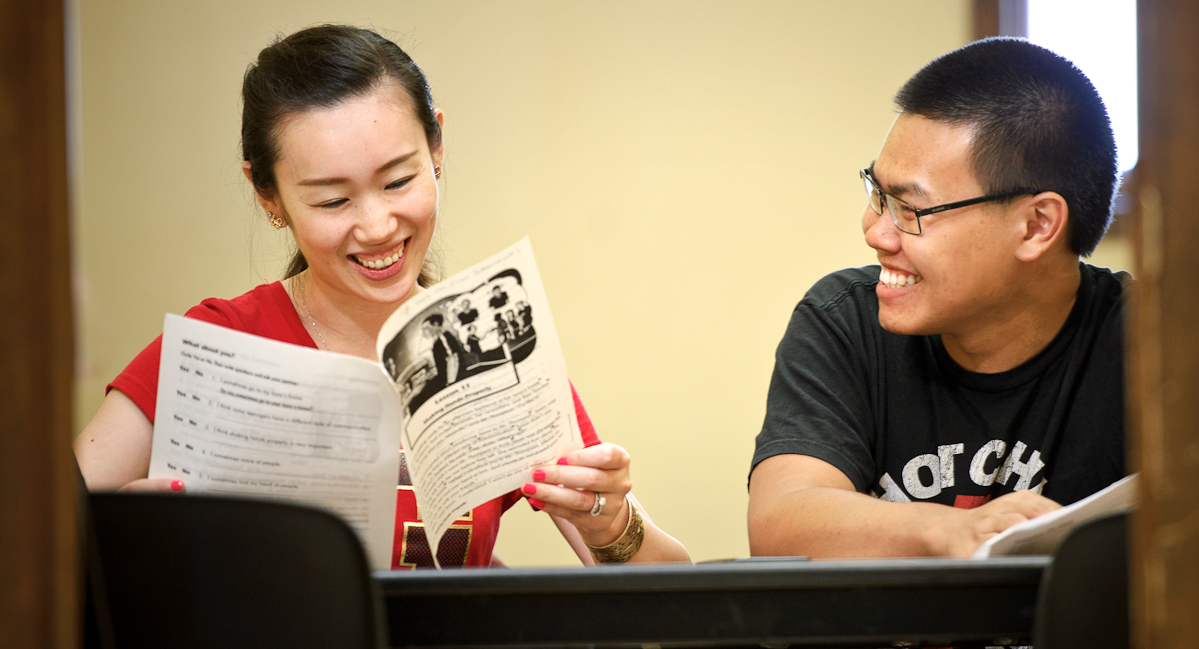
While students, faculty, staff and visitors to Hamilton know that the Mohawk Valley is a beautiful and engaging place to live, another striking feature of the area is its position as a cultural and ethnic melting pot, thanks in large part to the City of Utica’s diverse refugee and immigrant populations.
Hamilton’s dedication to the Upstate New York community that it calls home is in many ways exemplified by is its involvement in Project SHINE, or Students Helping In the Naturalization of Elders, a program dedicated to assisting in the incorporation and assimilation of immigrants and refugees into local communities.
Hamilton students participate in SHINE both of their own accord and through the almost 40 courses that have incorporated the project into their syllabi in the past. One of those students, Tanapat Treyanurak ’17, is this summer extending his experience with Project SHINE into a project funded through a Levitt Summer Research Fellowship.
Treyanurak has spent much of his summer at the Utica BOCES (Boards of Cooperative Educational Services) facility, tutoring students in English as a second language (ESL) and US citizenship. In addition to tutoring, he takes field notes, conducts interviews with refugee and immigrant students, and analyzes these observations through the lens of anthropological theory. His project advisor is Associate Professor of Anthropology Chaise LaDousa.
Though Treyanurak has not previously taken any anthropology courses, he said that his experience as a research tutor in the library, as well as his English minor and, to a lesser degree, his neuropsychology major have helped him through the process of applying this ESL experience to an anthropological framework.
Treyanurak, himself a learner of English as a second language, says that deficiencies in the ESL educational systems of America were among his primary motivations to undertake this sort of project. “It’s really sobering, I came to the states for the higher education system, but learning about the ESL education system from the perspective of immigrants, it’s not quite the land of opportunity and land of dreams that you might expect,” he said. “(The US) is a very welcoming country, but inside, systematically, it’s a whole big mess for ESL learners. We have people who get left behind, we have people who don’t get enough support.”
Treyanurak claims that the problems with ESL education in America may not be merely coincidental, but instead may be unintentionally bred by legal and social institutions. “In anthropology and sociology there’s a theory of social reproduction, which essentially says that one’s social class gets reproduced from generation to generation,” he explained. However, minority groups, such as immigrants and refugees Treyanurak works with at BOCES, may be particularly vulnerable to these sorts of institutional traps.
For example, Treyanurak cites the No Child Left Behind policy, which penalizes schools that underperform and rewards districts that produce strong results. ESL-heavy schools, he argued, almost always statistically underperform, which under NCLB means that a lack of funding is available for such schools, creating and exacerbating a cyclical pattern that disadvantages ESL learners.
It is for these reasons that Treyanurak hopes to enter into the field of education after graduation, to make a positive impact upon communities. That, at least, he has already begun to do, both through this project as well as his previous experience with Project SHINE during the Fall 2014 semester, which he hopes to return to during the coming academic year. “It’s heartening to know that something I’m doing can have a positive impact on the community,” he said, concluding that “it’s really nice to have access to the funding that I do, and that Hamilton supports these things. Of course research is important, but it’s nice to have support for these types of projects as well.”
 Read more
Read more 